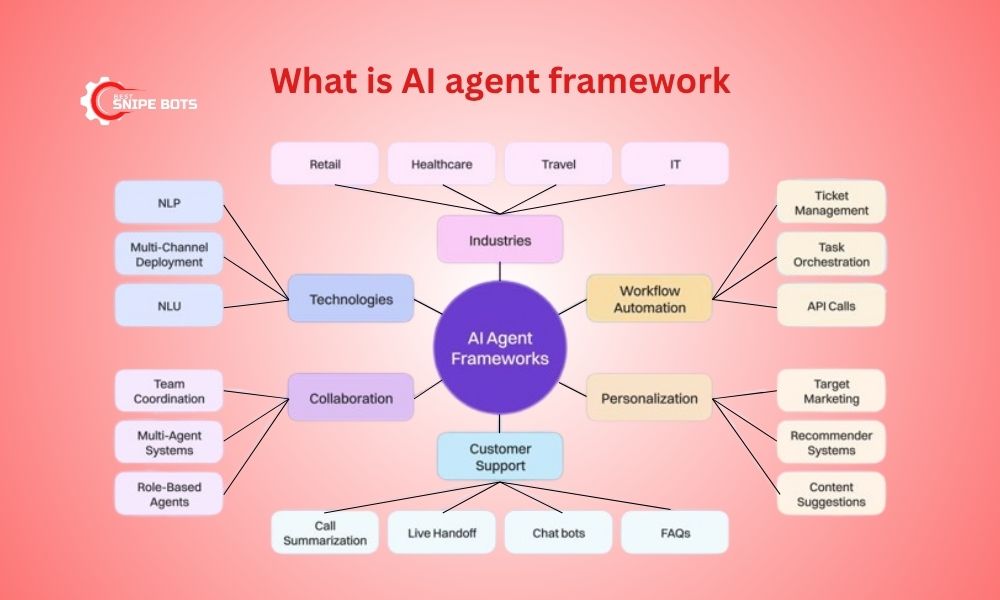What is AI agent framework is a question many people ask when exploring artificial intelligence. Simply put, it is a set of structures, libraries, and foundational tools that allow developers to build, manage, and deploy AI agents effectively. Instead of building from scratch, a framework provides essential, pre-built functional blocks, significantly accelerating the development process for intelligent applications.
A deeper look: What is AI agent framework?
To better understand what is AI agent framework, imagine it as the skeleton for a living being. This skeleton provides a solid structure and foundation, allowing us to add functional parts (muscles, organs) to create a complete entity capable of independent action. Similarly, an AI agent framework provides core components like communication capabilities, logical processing, and connectivity to other systems, helping developers focus on building the “intelligence” and specialized skills for the AI agent.
These frameworks are not just pieces of code; they are entire ecosystems that include:
- Libraries: Pre-written code sets for common tasks.
- Tools: Software that assists with debugging, deployment, and monitoring.
- APIs (Application programming interfaces): Allowing agents to interact with each other and with external software.
- Protocols: Communication standards to ensure smooth coordination.
Practical applications of AI agent frameworks

So, what are the real-world applications of what is AI agent framework? They are present in almost every sector, delivering immense value.
Customer support
This is the most common area of application. The framework allows for the creation of 24/7 customer support systems through:
- Chat bots: Instantly answering frequently asked questions (FAQs).
- Call summarization: Automatically summarizing the content of calls between customers and agents.
- Live handoff: When a chatbot cannot resolve an issue, it smoothly transfers the conversation to a human support agent.
Personalization
Businesses use AI agent frameworks to create unique experiences for each customer.
- Recommender systems: Systems that suggest products on e-commerce sites or recommend movies and shows.
- Content suggestions: Suggesting articles and news relevant to a reader’s interests.
- Target marketing: Analyzing data to send promotional messages to the right potential customers.
Applications across industries
The flexibility of what is AI agent framework allows it to be customized to suit many different industries:
- Retail: Inventory management, personalizing the shopping experience, and customer support.
- Healthcare: Scheduling appointments, reminding patients to take medication, and preliminary symptom analysis.
- Travel: Suggesting tours, booking flights and hotels, and providing 24/7 tourist support.
- IT: Automating incident response, managing support tickets, and monitoring systems.
Truly understanding what is AI agent framework is not just about grasping a technical term; it’s about seeing the future of intelligent automation. It is the key to building complex AI systems capable of learning, collaborating, and solving problems effectively, unlocking countless possibilities for businesses and organizations.
Core components and key technologies

A powerful AI agent framework is typically built upon advanced technologies. Understanding these technologies is the first step in fully answering the question, what is AI agent framework.
Technologies: The foundation of any intelligent agent is the ability to understand and interact. Technologies like NLP (natural language processing) and NLU (natural language understanding) enable AI to “read” and “comprehend” human requests. Furthermore, multi-channel deployment capability allows the AI agent to operate seamlessly across websites, mobile apps, social media, and other platforms.
Collaboration: A key advantage of these frameworks is the ability to create multi-agent systems. The capacity for teamwork is a central part of the answer to what is AI agent framework. Instead of a single AI doing everything, we can create multiple role-based agents, each specializing in a specific task. They can achieve team coordination to solve complex problems, much like a team of human experts.
Workflow automation: This represents the executive power of an AI agent framework. They can automate repetitive tasks like ticket management, orchestrate tasks between different departments (task orchestration), and execute API calls to interact with third-party software, thereby optimizing business operations.
In conclusion, an AI agent framework is a foundational toolkit and structure that simplifies and accelerates the process of building intelligent AI agents. Understanding what is AI agent framework helps us harness the full power of AI across many fields. To stay updated with more useful insights on technology and AI, don’t forget to follow Best Sniper Bots.